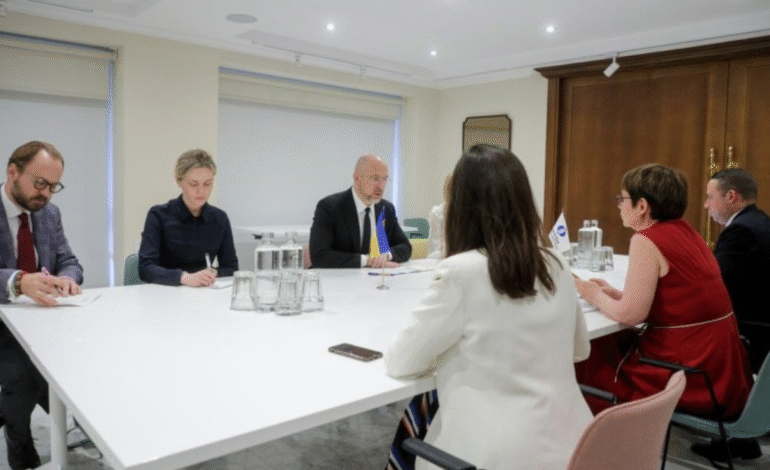Ukraine, EBRD Advance Plans for July Recovery Conference

In the context of international diplomacy and economic strategy, Prime Minister of Ukraine Denys Shmyhal recently held a significant meeting with Odile Renaud-Basso, President of the European Bank for Reconstruction and Development (EBRD). The discussion occurred during Shmyhal’s official working visit to Spain, timed alongside the United Nations International Conference on Financing for Development. The main focus was coordination and preparation for the forthcoming Ukraine Recovery Conference, which will take place in Rome this July.
As Ukraine continues its journey through complex reconstruction efforts following ongoing geopolitical challenges, the cooperation between international financial institutions and Ukrainian authorities has become more vital than ever. The meeting reaffirmed the commitment of the EBRD to Ukraine’s economic stability and progress, particularly in areas such as energy, transport, and communication.
High-Level Talks Strengthen Economic Recovery Framework
The bilateral meeting in Spain served as a continuation of long-standing collaboration between Ukraine and the EBRD. Prime Minister Shmyhal emphasized that both public and private sector partnerships are essential for ensuring sustainable recovery. One of the key elements discussed was the expansion of cooperation through the European Union’s guarantee mechanisms, a framework which has become increasingly instrumental in de-risking investments and facilitating capital flows into Ukraine.
Shmyhal noted the importance of finalizing several sector-specific agreements. These agreements are anticipated to cover critical industries that form the backbone of any modern infrastructure: energy supply systems, transportation networks, and digital communications. These negotiations build on a series of preliminary understandings reached during the Spring Meetings of the World Bank and International Monetary Fund in Washington earlier this year.
The EBRD’s involvement in Ukraine’s recovery is not limited to abstract policy planning—it is anchored in active funding and project implementation. According to the Ukrainian Prime Minister, these efforts are taking tangible shape in municipalities across Ukraine, where new projects are being developed to support public services and economic activity at the community level.
Rome Conference Seen as Key Milestone in Recovery Process
The upcoming Ukraine Recovery Conference in Rome is being treated as a pivotal event in Kyiv’s strategy to mobilize further support for national reconstruction. Scheduled for July, the conference is expected to bring together international financial institutions, donor governments, non-governmental organizations, and private investors. Preparation for such a high-level event requires coordination across multiple layers of governance and international diplomacy, and this meeting in Spain represented a vital checkpoint in that journey.
Prime Minister Shmyhal expressed optimism about the outcomes of the Rome conference. He sees it as an opportunity to showcase Ukraine’s reform agenda and present a unified strategy for long-term recovery. Shmyhal highlighted the importance of presenting specific investment opportunities during the event, especially those connected to infrastructure and energy resilience.
Investment and Funding Discussions Gain Momentum
A crucial aspect of the discussion between Shmyhal and Renaud-Basso was related to investment volumes and funding mechanisms. The Prime Minister took the opportunity to thank the EBRD for its consistent financial backing. Since the start of the full-scale conflict in Ukraine, the EBRD has mobilized nearly EUR 7 billion to support the Ukrainian economy. This includes funds directed at emergency needs and long-term infrastructure development.
One of the most immediate impacts of this cooperation is evident in the energy sector. In 2025, the EBRD approved a significant loan of EUR 270 million to Naftogaz, Ukraine’s national oil and gas company, for the urgent procurement of natural gas. This funding is aimed at ensuring the country’s energy security, especially during peak demand periods. Shmyhal also acknowledged the bank’s continued engagement with other state-owned enterprises, including Ukrenergo, the national electricity transmission system operator, and Ukrzaliznytsia, the state railway company.
Emphasis on Accountability and International Legal Mechanisms
In a notable part of his remarks, Shmyhal raised the issue of using confiscated Russian assets as a potential source of funding for Ukraine’s recovery. This idea, although contentious in certain diplomatic arenas, has gained some traction among advocates of transitional justice and post-conflict reparations. While Shmyhal’s statement reflects the aspirations of the Ukrainian government, it is part of an ongoing international debate involving legal, ethical, and policy considerations.
From a broader financial governance perspective, this proposal highlights the need for clearly defined mechanisms that align with international law. Though it remains a proposal under review in various jurisdictions, it reflects Ukraine’s determination to explore all available avenues to finance its reconstruction responsibly and transparently.
Building on Commitments from Spring Meetings
The dialogue between Ukraine and the EBRD is a continuation of momentum generated during earlier international gatherings. At the Spring Meetings in Washington, Ukraine presented several development blueprints that were received positively by global financial institutions. The current follow-up discussions in Spain underscore the importance of continuity in international engagement, particularly as Ukraine navigates complex political and economic challenges.
During those meetings, various stakeholders committed to providing financial guarantees, technical expertise, and capacity-building assistance. This included not only multilateral banks but also regional development organizations and bilateral aid agencies. The ongoing work aims to ensure that these commitments translate into actionable projects on the ground, and that new layers of support are added through platforms like the Rome Recovery Conference.
Strengthening Local Development Through International Projects
Beyond macroeconomic stability and national infrastructure, Ukraine’s recovery efforts also target regional and community-level development. One of the emerging priorities is to empower local governments to participate in project implementation and resource management. This approach ensures that reconstruction efforts reflect the needs of diverse populations across urban and rural areas.
According to Shmyhal, the EBRD is aligning its funding with these decentralization goals. The institution’s ongoing collaborations with municipalities involve not only physical infrastructure but also institutional development, such as improving local governance frameworks and procurement practices. These efforts aim to make Ukrainian communities more resilient, accountable, and capable of managing complex development challenges.
Future Outlook Rooted in Economic Reform and Partnership
As the Ukraine Recovery Conference approaches, the country’s leadership is emphasizing the importance of linking recovery with reform. Prime Minister Shmyhal reiterated Ukraine’s commitment to structural reform in sectors such as energy regulation, transportation, and digital services. By aligning recovery efforts with reform benchmarks, Ukraine aims to attract long-term investment and increase public trust in institutions.
EBRD President Odile Renaud-Basso, who has consistently voiced her institution’s support for Ukraine, acknowledged the challenges and opportunities ahead. Her presence at the upcoming conference is expected to further galvanize donor confidence. Meanwhile, the Ukrainian government continues to present itself as a committed partner ready to meet transparency, efficiency, and governance standards.
A Shared Path Toward Stability and Reconstruction
The partnership between Ukraine and the EBRD reflects a broader international effort to restore economic stability, promote investment, and rebuild critical infrastructure in conflict-affected regions. While the situation on the ground remains fluid, coordinated efforts at the diplomatic and financial levels indicate growing momentum toward sustainable recovery.
The recent meeting in Spain serves not only as a platform for technical dialogue but also as a symbol of enduring collaboration in the face of adversity. As preparations for the Rome Recovery Conference accelerate, all eyes will be on the ability of international actors to translate their commitments into concrete actions that improve the lives of millions of Ukrainians.
Strategic Cooperation Sets the Stage for Recovery in Rome
Ukraine’s recovery planning is entering a decisive phase. Through meetings like the one held between Prime Minister Shmyhal and EBRD President Renaud-Basso, the international community continues to signal its readiness to support Ukraine’s future. By focusing on energy, communication, and transportation, the two sides are addressing both immediate needs and long-term development goals.
The July conference in Rome is poised to become a landmark event in the reconstruction process, offering a platform for presenting Ukraine’s vision to the world. Backed by nearly EUR 7 billion in support and a growing network of partners, Ukraine is gradually laying the foundations for a stable and modern economy. International cooperation—rooted in mutual interest and shared responsibility—remains the central pillar of this evolving recovery agenda








2 Comments
[…] Ukraine is strengthening its national security by integrating its air and missile defense systems with NASAMS (Norwegian Advanced Surface-to-Air Missile System). This strategic collaboration with Norway’s Kongsberg Defence & Aerospace (KDA) aims to boost Ukraine’s air defense capabilities and bring its technology in line with global standards. […]
[…] efforts to digitize and streamline services for its citizens living abroad. With this launch, Ukrainians can now access notarial services through a secure online portal, eliminating the traditional need […]
Comments are closed.